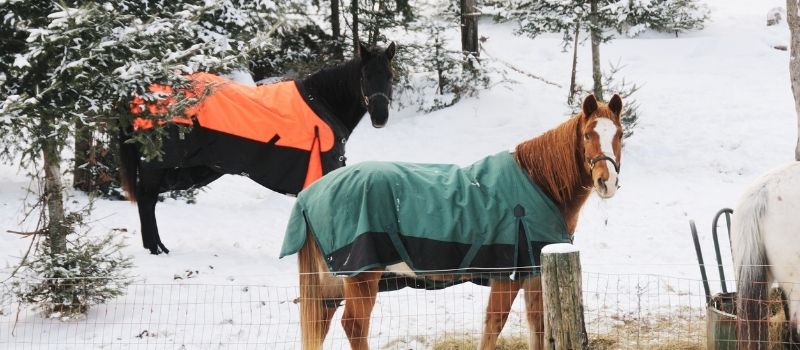10 Ways To Care For Your Horse In Winter

When I count my blessings, I count my horse twice
Horses are amazing creatures with great strength yet delicate. Many horse owners ask questions about the care/management of horses during the winter season, for instance,
- What are strategies to take care of a horse during winter?
- Does the winter season influence the overall performance of my horse?
In this article, we will discuss some important tips to take care of your horse during the winter season according to expert equastrians.
#1 – Nutritional Management
Nutrition plays an important role in the overall performance and well-being of a horse. As you know that, horses have special nutritional needs to stay healthy. During the winter season, horses require additional dietary allowances to keep their body warm. Being a responsible owner, this is your duty to adjust the nutritional requirements of your horse during winter (critically low-temperature).
Correlation of Lower critical temperature and nutritional demand: Let’s under the basic concept of lower-critical temperature (LCT) in horses. This varies from horse to horse. Some horses are winter acclimated(high-fat depots and thick hair coat) which have lower critical temperature as compared to short hair coat horses. Similarly, young horses also need special nutritional attention because low temperature decreases their growth rate (as horse uses energy to maintain body temperature instead of weight gain).
Forage
Forage is the best diet for your horse during winter. There are many studies that favor the use of grain during the winter season. Personally, I will recommend forage feeding because microbial fermentation of forage produces more heat as compared to grains. Furthermore, you can take dietary recommendations from an experienced equine nutritionist in this regard.
For every degree drop in temperature (18 F), a horse requires an additional one percent energy allowance in his diet. Remember, 18-19 F degrees is the lower critical temperature of a horse with a winter coat. Keep in mind that, a horse without shelter has more energy requirements than a sheltered horse. Also, monitor the body score condition of your horse regularly during winter and adjust his diet accordingly.
#2 – Physical Activity
Exercise is very much crucial for the best performance and health of your horse. Generally, horse owners reduce the physical activity of their horses during the winter season. Lack of exercise can lead to lower limb swelling (Oedema) in horses. So, this is better to let your horse do some physical activity during extreme winter.
Precaution: During extreme snowfall, be careful while riding in wet, deep snow. It can cause serious injuries to your horse.
#3 – Hoof Care
Hooves are important parts of a horse’s body. They require special care during the extreme winter season. It has been documented that hoof growth retards in the winter season. As you know, the incidence of hoof infections gets high during the wet season. Being a responsible owner, it is your duty to pay regular attention to the hooves of your beloved equine companion.
Make a well-designed strategy and protect your horse’s hooves with shoes. Shoes protect your horse from getting ice-balls and other winter-associated hoof conditions. Last but not least, hoof trimming should be done every six to twelve weeks preferably.
#4 – Use A Blanket
Blanketing a horse is a good idea. We have an article on the benefits of blanketing a horse, which you can read by clicking here. This protects your horse from the harsh effects of winter. Blanketing is preferably recommended for young horses. It has also been noticed that horses with body score condition (BCS) 3 or less should be blanketed.
Use properly fitted blankets. Check out the blankets regularly. Blankets must stay dry. Make sure that your horse is fully dry before putting blanket.
#5 – Keep Horse Stable CLean
Keep horse stable neat and clean to prevent the build-up of worms and other parasites. In winter, chances of pathogenic infections are very common.
#6 – Water Supply
Encourage your horse to drink plenty of water. Water intake is essential to the regulation of metabolism and other functions in horse’s body. It helps in the prevention of colic, easy passage of feces, etc. Keep in mind that your horse should drink much water and stay hydrated during winter season.
#7 – Provision Of Shelter:
Easy access to shelter plays an important role in preventing your horse from winter stress. Design a shelter area for your horse according to your available resources. However, during mild winter season horses should spend some time outdoor as well.
#8 – Dental Examination
Perform proper dental examination of your horse. Make sure that your horse is properly grinding the food. Remember, proper grinding of food is essential during winter to get maximum energy out of it.
#9 – De-worming Regiment
It is a nice idea to de-worm your horse before the start of the winter season. Preferably, use the dewormer that kills botflies. It is highly recommended to get veterinary consultation regarding the de-worming protocol of your horse.
#10 – Physical Examination
Perform an overall physical examination of your horse during winter. Keep a close eye on your horse temperature. Along with temperature, monitor the weight of your horse.
SUMMARY
Horses are most vulnerable during the winter season, which is why you should take more steps to ensure that your horse stays healthy during this time. Remember, an ounce of prevention is worth a pound of cure.
How To Sell Your Horse Fast
Do you want to sell your horse fast? We've put together a guide to help you understand your options and walk you step by step through the process.




